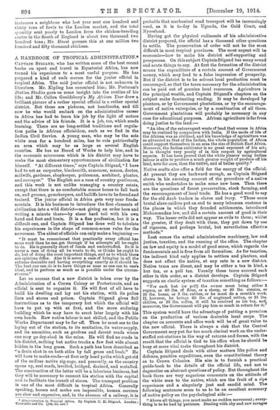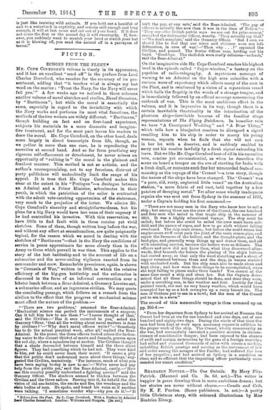A HANDBOOK OP TROPICAL ADMINISTRATION.* CAPTAIN STIGAND, who has written
some of the best recent books on sport and travel in Equatorial Africa, has now turned his experience to a most useful purpose. He has prepared a kind of vac mecum for the junior official in tropical Africa. The said junior official is not unknown in literature. Mr. Kipling has canonized him; Mr. Portman's Station Studies gave us some insight into the routine of his life; and Mr. Cullen Gouldsbury's My African Year drew a brilliant picture of a rather special official in a rather special district. But these are pictures, not handbooks, and till now he who would embark on the administrative career in Africa has had to learn his job by the light of nature and the advice of his friends. It is a job, too, which needs learning. There are no long-settled traditions and regula- tion paths in African officialdom, such as we find in the Indian Civil Service. A young man, who may be the sole white man for a hundred miles, has to rule patriarchally an area which may be as large as several English counties. He has no Board of Works to help him, and in the economic microcosm which is his district may have to make the most elementary appurtenances of civilization for himself. "At different times," says Captain Stigand, "I have had to act as carpenter, blacksmith, armourer, mason, doctor, midwife, gardener, shopkeeper, policeman, architect, planter, and surveyor." The English are a race of country gentlemen, and this work is not unlike managing a country estate, except that there is no comfortable manor house to fall back on, and grooms, gamekeepers, and bailiffs have to be found and trained. The junior official in Africa gets very near funda- mentals. It is his business to introduce the first elements of civilization into a wild district—not giving an order here and writing a minute there—by sheer hard toil with his own hand and foot and brain. It is a fine profession, but it is a difficult one, and Captain Stigand has done well to tabulate his experiences in the shape of common-sense rules for the newcomer. The ablest of officials can only make a beginning :— "It must be remembered that practically every official has more work than he can get through if he attempts all he ought to do. He is generally short of funds and understaffed. So it is never a case of doing all he wants to do, or thinks he ought to do, but of doing the most important things, and as to which these are opinions differ. Also it is never a case of bringing in all the reforms desirable and having everything exactly as it should be. The best one can do is to have things as near as one can to one's ideal, and to perform as much as is possible under the circum- stances."
Let us assume that a new district is taken over by the Administration of a Crown Colony or Protectorate, and an official is sent to organize it. He will first of all have to build his dwelling and lay out his station, with its police lines and stores and prison. Captain Stigand gives full instructions as to the temporary but which the official will have to put up with at first, and the more enduring building which he may have to erect later largely with his own hands. Raw native labour is not skilled, and the Public Works Department may be far off. Then be must see to the laying out of the station, to its sanitation, its water-supply, and its amenities, such as gardens and decent roads where one may go dry-shod in the rains. He will find no roads in his district, nothing but native tracks a few feet wide almost bidden in the long grass. Such a path has been described as "a drain shut in on both sides by tall grass and bush." He will have to make roads—at first only hoed paths which get rid of the endless native zig-zags, and presently, as the country opens up, real roads, levelled, bridged, drained, and metalled. The construction of the latter will be a laborious business, but
they will be necessary to connect his station with the capital and to facilitate the transit of stores. The transport problem is one of the most difficult in tropical Africa. Generally speaking, horses and mules are impossible, human carriers are slow and expensive, and, in the absence of a railway, it is
• Administration in Tropical Africa. By Captain C. H. Stigand. London Constable and Co. [10e. 6d, nat.1
probable that mechanical road transport will be increasingly used, as it is to-day in Uganda, the Gold Coast, and Nyasaland.
Having got the physical rudiments of his administrative district prepared, the official has a thousand other questions to settle. The preservation of order will not be the most difficult in most tropical provinces. The most urgent will be
economic—how to make his district self-supporting and prosperous. On this subject Captain Stigand has many sound and acute things to say. At first the formation of the district means the expenditure of a certain amount of Government money, which may lead to a false impression of prosperity. But if the district is to bo solvent local production must be encouraged, so that the taxes necessary for the administration can be paid out of genuine local resources. Agriculture is the principal wealth, and Captain Stigand's chapters on the subject make fascinating reading. It may be developed by planters, or by Government plantations, or by the encourage. ment of native enterprise, or by a combination of all three. Government plantations will probably be necessary in any case for educational purposes. African agriculture is far from doing justice to the land:— "An idea of the extravagant waste of land that occurs in Africa may be realized by comparison with India. If the mode of life of the African was as civilized, and his knowledge of agriculture was as advanced as that of the Indian, the whole population of Africa could support themselves in an area the size of British East Africa. Moreover, the Indian cultivator is no great exponent of his art; he is thought very poorly of in this respect by agricultural experts. It has been proved that the white planter using Indian labour is able to produce a much greater weight of produce off his land, acre for acre, than the native) and of better quality."
Native crafts also offer a field for the energy of the official. At present they are backward enough, as Captain Stigand shows in his amusing account of the procedure of a native smith who undertakes to make some new hoes. Then there are the questions of forest preservation, stock farming, and the encouragement of local trade. He has a good word to say for the old Arab traders in slaves and ivory. " These same brutal slave-raiders put an end to many inhuman customs in the places in which they founded settlements, introduced Muhammadan law, and did a certain amount of good in their way. The lesser evils did not appear as evils to them; whilst the greater, if they dealt with them, they put down by use of rigorous, and perhaps brutal, but nevertheless effectise methods."
Last comes the actual administrative machinery, law and justice, taxation, and the running of the office. The chapter on law and equity is a model of good sense, which regards the fundamentals and is free from all formalism. As for taxation, the indirect kind only applies to settlers and planters, and does not affect the native, at any rate in a new distlict. Native taxes are direct, and may be either a tax in kind, a but tax, or a poll tax. Usually these taxes succeed each other in this order, as a district develops. Captain Stigand suggests an elastic system of taxation something as follows "For each but (or poll) the owner must bring either 3 rupees, or 60 lbs. of flour, or a sheep, or 20 lbs. simsim, or 20 lbs. beans, or 2 lbs. rubber, or he must do a month's work. If, however, he brings 60 lbs. of unginned cotton, or 25 lbs. chillies, or 20 lbs. coffee, it will be received as his tax, and, moreover, the Government will pay him so much in return for it" This system would have the advantage of putting a premium on the production of various desirable local crops. The chapter on accounts and office work will be of great value to the new official. There is always a risk that the Central Government may put far too much clerical work on the under- staffed out-stations in the way of returns and forms, with the result that the official is tied to his office when he should be
busy at more vital tasks throughout his district. Captain Stigand deals with other matters like police and
defence, punitive expeditions, even the constitutional theory as to Crown Colonies. His aim is to furnish a practical guide-book to the details of the official life, and not to dogmatize on abstract questions of policy. But throughout the book there are very sagacious comments on the attitude of the white man to the native, which are the fruit of a ripe experience and a singularly just and candid mind. The following sentences seem to us to be an excellent summary of native policy on the psychological side :— "Above all things, you must make no sudden movement ; every- thing is to be had by patience. Dealing with shy and raw savages is just like training wild animals. If you hold out a handful of salt to a waterbuck in captivity, and remain still enough and long enough, it will at last come and eat out of your hand. If it does not come the first or the second day it will eventually. If, how- ever, you suddenly want to scratch your head or clutch your hat as it is blowing off, you send the animal off in a paroxysm of terror."







































 Previous page
Previous page